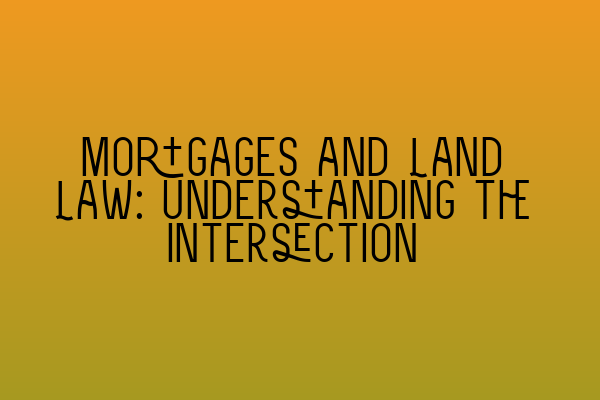Mortgages and Land Law: Understanding the Intersection
When it comes to property transactions, understanding the intersection between mortgages and land law is essential for both property lawyers and clients alike. A mortgage is a secured loan that allows individuals to borrow money to purchase a property. This loan is secured by the property itself, meaning that if the borrower fails to make the required repayments, the lender has the right to take possession of the property, known as foreclosure.
In this blog post, we will explore the key concepts that exist at the intersection of mortgages and land law, providing you with a comprehensive understanding of how they interact.
The Creation of Mortgages
The creation of a mortgage involves two main parties – the borrower (mortgagor) and the lender (mortgagee). The borrower pledges their property as security for the loan, effectively giving the lender a proprietary interest in the property. This proprietary interest allows the lender to exercise certain rights and remedies in the event of default.
There are two types of mortgages – legal mortgages and equitable mortgages. Legal mortgages involve the transfer of legal title to the lender, whereas equitable mortgages only grant an equitable interest to the lender. The type of mortgage used can impact the rights and obligations of both parties, so it is important to consider this carefully.
Mortgages and Land Registration
Land registration plays a crucial role in the mortgage process. In most jurisdictions, mortgages must be registered in the land registry to be effective. Registration provides notice to third parties, ensuring that future buyers or lenders are aware of the existence of the mortgage and the lender’s interests.
Additionally, land registration systems often provide priority rules, determining the priority of mortgages in cases of multiple interests or competing claims. Priority can impact the lender’s ability to recover the debt, making it vital to understand the rules and protect the lender’s position.
Enforcement and Remedies
In the event of default, the lender has the right to enforce the mortgage and seek appropriate remedies. Common remedies include foreclosure, power of sale, and possession. Foreclosure involves the lender seeking a court order to take possession of the property and sell it to repay the outstanding debt. The power of sale grants the lender the ability to sell the property without court involvement. Possession allows the lender to take physical possession of the property while the debt remains unpaid.
It is important to note that enforcement procedures can vary depending on jurisdiction and the type of mortgage. Therefore, it is crucial to consult with an experienced property lawyer to understand the options available in your specific situation.
Conclusion
Mortgages and land law are interconnected aspects of property transactions. Understanding the role of mortgages in land law is crucial for property lawyers and clients alike. By comprehending the creation of mortgages, the impact of land registration, and the available enforcement measures, individuals can navigate mortgage transactions confidently and protect their interests.
At SQE Property Law & Land Law, we are well-versed in the complexities of mortgages and land law. Our team of experts is equipped to provide you with comprehensive legal advice and guidance, ensuring that your property transactions proceed smoothly and successfully. Contact us today to schedule a consultation.
